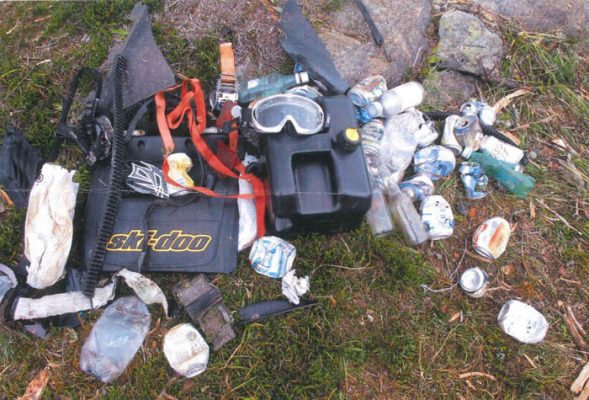
Some backcountry enthusiasts are describing behaviour from snowmobilers as “garbage.”
Two separate groups frequenting the backcountry in McBride — specifically Renshaw Meadows — have submitted complaints to the Ministry of Environment regarding trash being left in the backcountry by snowmobilers.
“Backcountry camping and hiking has always been a part of our collective lives,” says Mike Simpson, referring to a group of about 15 people including his family and friends.
Simpson’s group does the hike every year, and says they have a “pack out more than you pack in” mindset. The group, according to his letter, collects and brings out as much trash as they can carry.
“The garbage we picked up included a snowmobile mudflap, a fuel container (partially full), two sets of snowmobile goggles, broken tail lights, a GPS unit, a hatchet, a shovel handle, pliers, tie straps, food containers, a wallet, sunglass lenses, misc. plastic parts, nylon strapping, bungee cords, etc.,” says Simpson, noting too, the group collected over 100 food cans as they hiked.
After collecting the trash, Simpson’s letter to the ministry says they flew out the trash by helicopter at their own expense, and according to Simpson, the finger should be pointed at the snowmobile community.
“Snowmobilers are without questions the source of this garbage,” he says, “What we collected is just the tip of the iceberg.”
The unfortunate part, according to some locals, is not all snowmobilers are litter-bugs, but it’s these people who give the community a bad name.
“It’s too bad all the users of our backcountry don’t get and apply the “take out more than you take in” approach,” says Kelly Harding, a McBride snowmobiler.
“The majority of the backcountry users are very respectful of our natural areas… and mention it to other folks if we see someone not paying attention to it,” he says.
Organizations like the Valemount Area Recreation Development Association (VARDA) take measures to try and educate snowmobilers on the importance of cleaning the backcountry.
A second group of hikers, calling themselves the Grizzly Group, sent a similar complaint to the ministry with a far more extensive trash inventory.
Both complains were sent to various local organizations, in addition to the Ministry, including VARDA, McBride Big Country Snowmobile Association, Valemount and McBride Chamber’s of Commerce, as well as multiple provincial ministries.
After The Goat Newspaper made various attempts, the local snowmobile club in McBride, the Big Country Snowmobile Association, declined to comment for this story.
In its response to Simpson, the Ministry of Environment’s Assistant Deputy Minister Jim Standen says though Conservation Officers have the ability to enforce littering, it’s a difficult task, as “higher priority issues” often supersede.
“There are human-wildlife conflicts and major environmental violations and investigations have a significant impact on the environment and on human health,” the statement reads.
“If there is evidence of who dumped the garbage… it is possible for an officer to follow up and issue a ticket,” it says.
The Ministry of Environment encourages people to phone the 24-hour Report All Poachers and Polluters (RAPP) line in these instances.
Fines related to poaching and littering are punishable by way of a $2,000 fine or up to six months in prison, depending on the offence, according to the ministry.



